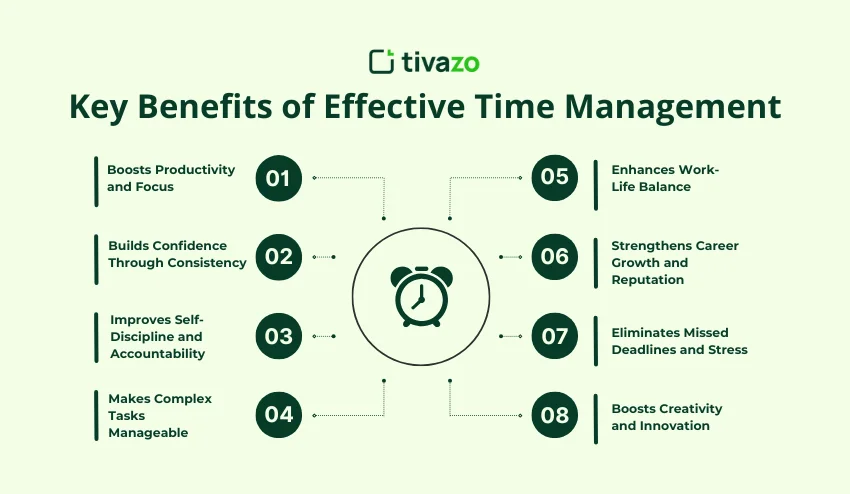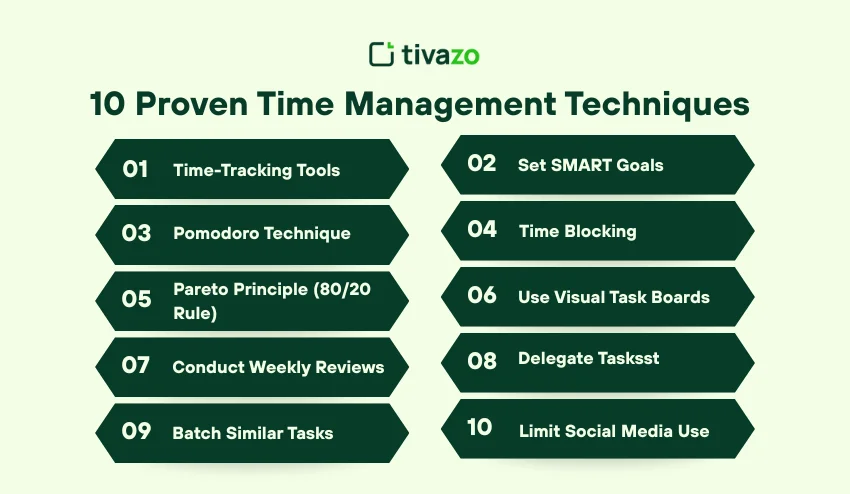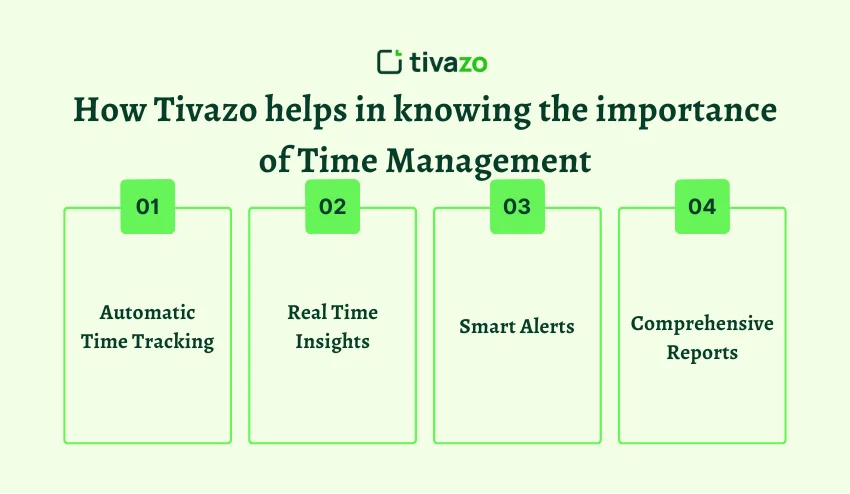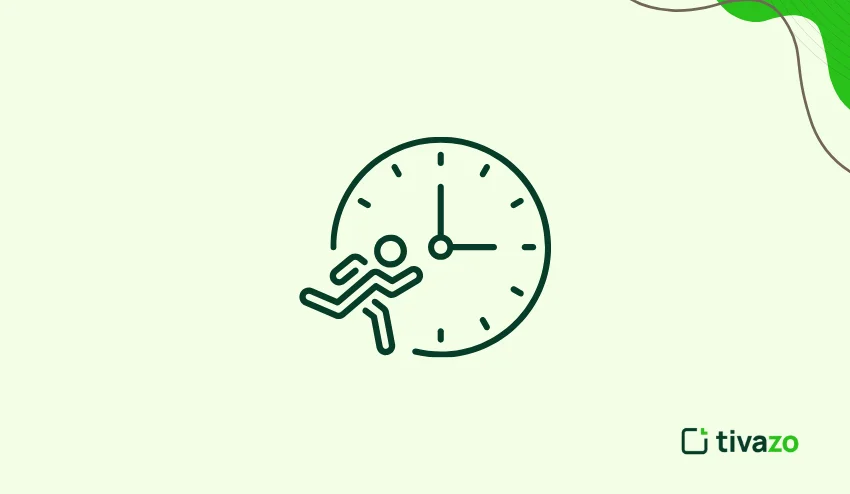Importance of time management is not undeniable, especially in today’s fast-paced environment, it often feels like there aren’t enough hours in a day. Deadlines, appointments, assignments, and even personal commitments fight for your attention. It is in understanding the value of managing your time appropriately that the true value lies. If a person manages their time well, productivity is likely to improve, stress will be less, and a better balance of work and personal life may result. We will unpack a definition of time management, the value of it. How to manage time and implement it in our daily lives and get control of our day.
Key Highlights:
- What Is Time Management?
- Why Time Management Matters?
- Key Benefits of Effective Time Management
- Proven Time Management Techniques to Try
- Time Management in the Workplace
- Digital Tools and Apps That Make Time Management
- How Tivazo helps in knowing the importance
What Is Time Management?
It is the practice of planning, prioritizing, and organizing your day-to-day activities so you use your available time wisely. Time management is more than creating schedules; it involves making tactical decisions so you work on things that are important. A few benefits of a well-managed use of time are being able to meet deadlines, reducing stress, and freeing up time for important things you enjoy.
For instance, a professional who schedules 90 minutes of uninterrupted work time for high-priority tasks is achieving more productivity than someone who is sporadically checking emails throughout the day.
Why Time Management Matters?
In our distracted world, with our ever-present smartphones and daily stream of notifications, effectively managing your time is very important. Poor time management leads to increased levels of stress, missed deadlines, and the feeling of having too much to do, and too little time to get it done! Research has indicated that the importance of time management strategies is associated with lower levels of stress and higher rates of productivity.
Key Reasons why management of time Matters:
- Reduce stress and anxiety
- Increase focus and decision-making
- Enhance overall productivity
- Generate a better work-life balance
- Common Challenges and Overcoming Them
If you are able to master and apply time management, you can use your time to serve your priorities and not allow your day to dictate you.
8 Key Benefits of Effective Time Management
Effective time management has many benefits. Some of them are:

1. Boosts Productivity and Focus
A significant benefit of effective time management is that it enhances your productivity and focus. It enables you to prioritize tasks and provides an opportunity for you to concentrate on the most important tasks, areas, or issues. Once you have set goals and timeframes to dedicate to your highest value work, you will be able to get more accomplished in a shorter period of time. This also helps you to avoid distractions and minimizes the time you spend on unproductive work.
- Work on high-priority tasks first.
- Minimize non-essential time on non-essential work.
- Accomplish more without having to put in longer hours.
2. Builds Confidence Through Consistency
Accomplishing objectives timely and professional manner generates satisfaction. Consistently achieving goals enables self-confidence in managing priorities. Gradually, this ongoing, steady performance yields a reputation for dependability, with respect from colleagues and supervisors.
- Develop trust with those with whom you work.
- Develop the habit of consistently accomplishing professional tasks.
- Build trust in handling increased levels of responsibility.
3. Improves Self-Discipline and Accountability
You develop discipline when you learn to manage tasks and time effectively. Sticking to a schedule and time tracking develops personal accountability, which applies to all aspects of life. A strong sense of accountability often leads to self-discipline through the opportunity to proactively combat procrastination and should be learned as part of your healthy habits for long-term success.
- Develop a regimented daily routine.
- Consistently track progress towards goal completion.
- Effectively recognize and avoid procrastination and distraction.
4. Makes Complex Tasks Manageable
Managing larger projects becomes less intimidating when divided into manageable bits or steps. Creating a plan generates a satisfyingly engaging “method” for managing a challenge. Time management allows you to view the daunting task as it is comprised of smaller components, can tackle the larger project in smaller steps, has a plan, and generates a method. You can check steps off while you track progress to confidently and consistently continue to take on the larger task while building a small win in the process.
- Separate larger project into achievable steps.
- In small chunks, check progress towards completing the steps in the process.
- Stress becomes reduced as the larger task now manageable in steps and have a plan.
5. Enhances Work-Life Balance
Importance of Time management is that it improves work-life balance by scheduling work and breaks that allow for personal growth. You will be able to fulfill commitments while respecting personal interests and family time. Schedules also give the time to recharge and maintain a healthy mind and body.
- Make sure to schedule time for activities, family, and self-care.
- Avoid burnout by controlling the work process.
- Keep your energy at peak level.
- Plan for reflection and personal growth.
6. Strengthens Career Growth and Reputation
Being a person whose work is always on time, in a reasonable time frame, and productivity keeps others thinking highly of you, and your time management can lead to promotions, recognition, and eventually career opportunities. Employers and colleagues tend to give responsible tasks to employees who can manage time effectively.
- Be a person others can rely on to get their work done.
- Create opportunities for promotion and a higher level of responsibility.
- Develop a professional reputation for performance.
7. Eliminates Missed Deadlines and Stress
Utilizing structured time management allows you to avoid the last minute rush and the stress that comes along with it. You know exactly when you are going to accomplish a task and what that will look like so your workflow becomes more organized and controlled. Being in this proactive mindset fosters a sense of control and confidence which makes work feel less overwhelming.
- Think ahead to eliminate the last-minute pressure.
- Create a safe buffer for stressful situations with clear timelines.
- You will maintain control of your workload and your priority levels.
- Be more engaged and confident each day.
8. Boosts Creativity and Innovation
When you have created habits that allow you to manage your time well, your mind will have more clarity and space to think creatively and potentially come up with new ideas. Reducing stress and removing unnecessary tasks frees you to think innovatively and develop solutions in your work and personal life.
- Block off the occasional time to just mind dump or brainstorm.
- And utilize structured time off to some extent to let ideas develop on their own.
- Think about tackling your work projects with a fresh, creative eye.
- Create a balance of routine tasks and some forward time for creativity.
Common Challenges and How to Overcome Them
Even if you mean well, you won’t always be able to manage your time well. Everyone will experience predictable challenges like procrastination and poor planning that can hinder productivity. Understanding those challenges and following some helpful strategies is critical to controlling you time, and achieving your goals.
| Challenges | Solution |
|---|---|
| Procrastination | Use the 2-Minute Rule (start small tasks immediately) |
| Lack of Motivation | Set clear goals and reward yourself for completing tasks |
| Perfectionism | Aim for progress over perfection to avoid delays |
| Multitasking | Focus on one task at a time to improve efficiency |
Quick Start Guide: How to Improve Your Time Management Today
Getting started with the importance of time management doesn’t have to be complex. Calculated changes in your daily routine can yield substantial results over time. By gaining a better understanding of how you are using your hours and practicing some simple techniques, you can take control of your schedule. The following set of steps provides a useful roadmap to get you started quickly improving your productivity.
- Audit Your Time – Take a week to track how you have spent your days to discover where you are wasting time.
- Choose One Technique – Select one of the following techniques to start your new management of time challenge: Pomodoro Technique or Time Blocking, or Eisenhower Matrix.
- Set Micro-Goals – Practice breaking down your activities into smaller, manageable goals.
- Self-reflect Weekly – Review what you accomplished each week and adjust your planning accordingly.
The Science Behind the Importance of Time Management and Productivity
Cognitive psychology indicates that humans have limited attention spans. Parkinson’s Law states, a task will expand to fill the time allotted so for the sake of efficiency and result, impose time limits. Cognitive load theory shows us the benefits of breaking tasks into smaller pieces, reducing cognitive load, improving one’s focus, and increasing motivation. Importance of Time management maximizes the enjoyment of the cognitive load, while minimizing stress.
10 Proven Time Management Techniques to Try
Learning the difference between working harder and working smarter will help you learn to master your time. These evidence-based approaches will help you focus on what matters and make you feel less stressed as your productivity increases! Whether you are a student, professional, or entrepreneur, these time management tips applied consistently will guarantee better and faster productivity.

1. Time-Tracking Tools
Use one of the time-tracking apps like Tivazo to analyze how you are spending your time. Tracking your hours will tell you exactly how you are wasting your hours and in turn, you will plan more purposefully.
2. Set SMART Goals
Make a goal that is SMART (Specific, Measurable, Achievable, Relevant, & Timely). Goals gain significance and give clarity as this also allows you to keep track of completion and give you motivation.
3. Pomodoro Technique
Work for a set period of time (25-30 mins), take short breaks. By breaking projects down into timed working periods, you can increase your concentration and avoid mental fatigue.
4. Time Blocking
Set blocks of time to address specific tasks and/or meetings. This will help you structure your day, and more importantly, help you focus on one activity without interruption.
5. Pareto Principle (80/20 Rule)
Focus on those tasks that yield the most value. Identifying the 20% that gives you 80% of the results will help keep you busy while being less busy.
6. Use Visual Task Boards
Use a visual task board, such as Trello or a traditional Kanban board, to help visualize your progress. Visually seeing the tasks move from To Do to Done will help continue motivate you, and tasks won’t fall through the cracks!
7. Conduct Weekly Reviews
At the end of each week, reflect on what you accomplished, what tasks will be the focus for next week, and any goals. This will help you reflect on where you need improvement, adjust your to-do list for next week, as well as start next week with a plan!
8. Delegate Tasks
Delegate work to team members who possess the skills to accomplish the task. Delegating to others will help to free up even more time for you to address highly prioritized tasks and the team members will be thankful because they can work effectively, too!
9. Batch Similar Tasks
Group similar tasks together, such as emails or phone calls, in your work day. Grouping together similar work tasks will help to reduce the mental load of switching between different tasks to be more efficient.
10. Limit Social Media Use
Allocate specific times to check social media, messages and notifications. This prevents distractions and helps you remain focused on work/study.
Time Management in the Workplace
In today’s competitive job market, effective time management is necessary for your own success, and for the success of your organization. It is common for professionals to juggle numerous projects, meetings, and deadlines, which can create stress, and reduce productivity if not managed well. By utilizing the time management strategies discussed in this presentation, employees can focus on high-value tasks, stay efficient, and establish a flow to their workday. An individual’s prioritization skills also promote effective collaboration within teams, positively affecting performance for the organization as a whole.
Professionals use time management skills to:
- Open up time for unproductive meetings
- Prioritizing tasks of higher impact
- Know how and when to delegate
- Meet deadlines in a remote working environment
Employers reward employees who demonstrate the importance of time management skills, which show their carry-over to promotions and team cohesiveness.
Time Management for Students and Learners
Students are often responsible for balancing multiple obligations. Whether it’s balancing classes, homework, studying for exams, or working part-time, we can all understand how, without knowing importance of time management, students can feel overwhelmed and fall behind. Learning how to arrange and prioritize your calendar allows students to manage school work while reducing stress and creating space for self-growth and social activities.
Knowing the importance of Time management can help you to:
- Organize times to study and review for your classes – You can utilize dedicated time for each subject of study that permits maximum retention.
- Balance your academics and social life – Personal time should never include academic time.
- Finish assignments early, less stress– Students love to procrastinate, and knowing the importance time management is the best way to control your deadlines.
Using methods such as study planners and more commonly the Pomodoro technique, students are more likely to stay on track and retain learning.
Digital Tools and Apps That Make Time Management Easier
In the Digital age that we live in now, using the right tools to facilitate your workflow can help you and boost your productivity. Knowing the importance of Time management applications or software make it easy to plan, track and prioritize your homework with least amount of distraction possible. Using the right tools for your workflow helps to save time, reduces stress, and helps you from missing important deadlines.
| Tool | Use Case | Key Feature |
|---|---|---|
| Notion | Personal organization | Customizable boards & templates |
| Todoist | Task tracking | Priority levels & reminders |
| Clockify | Work hours | Time tracking & reporting |
| Trello | Project management | Kanban boards |
| Google Calendar | Scheduling | Shared calendars & alerts |
Using the right digital tools will help you organize, track, and get things done efficiently.
How Tivazo helps in knowing importance of Time Management
Tivazo makes knowing importance of time management by different ways like:

- Automatic Time Tracking: Allows staff to log their working hours easily and accurately.
- Real Time Insights: Allows you to follow activity, idle time and productivity trends.
- Smart Alerts: Provides immediate alerts for idling employees to reduce inefficiencies.
- Comprehensive Reports: You can analyze working time, top performers and trends by adding a timesheet you can export.
Conclusion: Make Time Work for You
Getting a handle on the value of time management isn’t about figuring out how to get more into your day; it is all about using the hours you have effectively. By including simple techniques, digital tools, and planning procedures, you will get more done, become less stressed, and create a better work/life balance. Start small, be consistent, and take control of your time – your productivity, career, and well-being will thank you.




